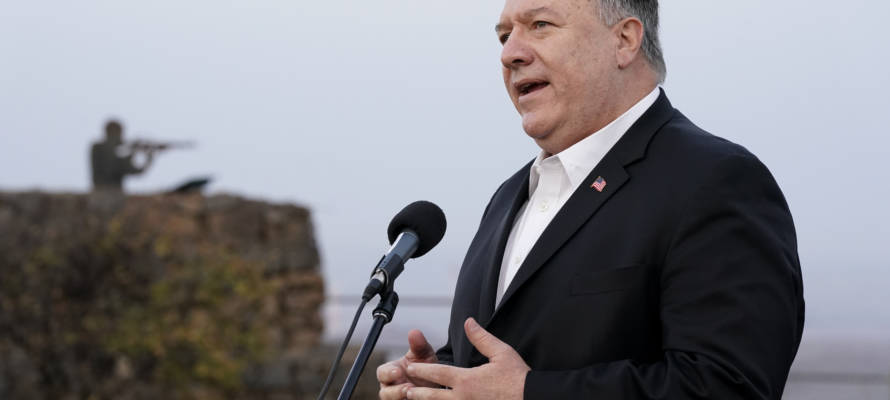Is the point of the journalism to reporting the facts, or to inaccurately sensationalize the news for an audience eager to slander Israel as a “toilet” for American taxpayer dollars?
By Ira Stoll, The Algemeiner
US Secretary of State Mike Pompeo speaks after a security briefing on Mount Bental, in the Golan Heights, Israel, Nov. 19, 2020. Photo: Patrick Semansky / Pool via Reuters.
The Trump administration’s foreign policy leadership and the current New York Times Jerusalem bureau chief may both be in their last few months in the job, but they are going out with a bang, as the Times keeps inaccurately characterizing what Trump officials are doing.
The outgoing Times bureau chief, David Halbfinger, has a byline from Jerusalem over a news article reporting about Secretary of State Michael Pompeo’s visit to Israel. “In another first for a U.S. secretary of state, Mr. Pompeo flew in the afternoon to the long-disputed Golan Heights, along Israel’s frontier with Syria,” the Times reports.
It’s not accurate to characterize a visit to the Golan Heights as a “first for a U.S. Secretary of State.”
A simple check of the Times archives turns up a report of a visit to the Golan in 1993 by Warren Christopher, who served as secretary of state during the first term of the Clinton administration. The Times reported then:
“At a briefing site on the Golan Heights, Gen. Yitzhak Mordechai, commander in chief of Israel’s northern command, spread out large maps and, using a pool cue, gave an impassioned lecture on Israel’s geographical vulnerability and the importance of the strategic plateau, which Israel captured from Syria in the 1967 Middle East war, for the country’s security. Mr. Christopher’s question — where were the borders before Israel occupied the territory? — left Israeli officials puzzled. Was it a trick of some sort? Did Mr. Christopher really not know where the pre-1967 borders were, or did he somehow want to draw attention to what Israel used to be?”
The Times reported in 1991 that then-Secretary of State James A. Baker III also toured the Golan by air. “Mr. Baker took a helicopter tour to allow the Israelis to show him how narrow the country was within its pre-1967 boundaries — 10 miles wide and five minutes by helicopter. He also got to see the Golan Heights from the air, as well as Israeli settlements in the West Bank,” the Times reported in a front-page news article in 1991.
The Times left comments open on the article about Pompeo’s visit, and as usual, they were a cesspool. “Any future politician that wants to cut off the taxpayer funded gravy train to Israel and stop flushing our tax dollars down this toilet will have my vote. At what point does our slavish idiotic support of this country come to an end? When do they stand on their own two feet? I don’t recall France still feeling compelled to send billions of dollars and weapons 70 years after the revolution. If they really still need American taxpayers to fund them then maybe they shouldn’t be a country or maybe they should be our 51st state and pay taxes?” writes one Times commenter, “Blackcat66,” from New Jersey, whose comment likening Israel to a toilet was upvoted by 24 Times readers within 30 minutes after being posted. The France comment is funny because America is still funding NATO to defend France more than 70 years after the end of World War II.
As with Trump’s recognition of the West Bank settlements as not illegal, the Trump administration has a political interest in making it seem more unprecedented than it actually is. Why the Times plays along is a different question. Maybe it helps the article get better placement. “First-ever Golan Visit by Secretary of State” gets more clicks than “Routine Golan Visit by Pompeo Follows Bipartisan Pattern Set by Predecessors.” But some Times subscribers may have been under the apparently mistaken impression that the point of the journalism is to provide accurate context and reporting of the news, not to sensationalize it inaccurately while capitalizing on clicks from a Times audience eager to consume anything that confirms their existing view of Israel as a “toilet” for American taxpayer dollars.
On one level, it’s just a minor factual error — a Times article claiming something is the “first” when it actually isn’t (though such factual errors are unfortunately frequent in Times Israel coverage). But it is significant, because it plays into the false narrative that warm US-Israel relations are a product of President Trump’s unusual presidency rather than the result of the longstanding and bipartisan US-Israel relationship driven by shared values and national interests.
That’s not to take anything away from Pompeo or Trump, who have been stalwart allies of Israel. But it doesn’t do a strong US-Israel relationship any favors to portray it inaccurately as a Trump-era innovation.
Ira Stoll was managing editor of The Forward and North American editor of The Jerusalem Post. His media critique, a regular Algemeiner feature, can be found here.


No comments:
Post a Comment